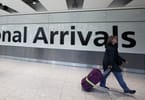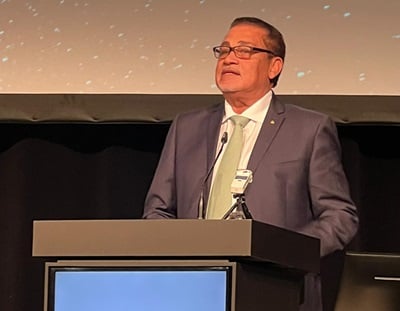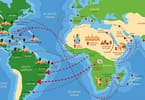于尔根·斯坦梅茨(Juergen Steinmetz):
Before we get to get started I like to introduce our co-host Dr. Peter Tarlow, who is also vice-chair of the word tourism network, and one of our founders is in Texas. And Peter wanted to say a few words before we get to Gavin. You have to unmute yourself. Otherwise, we will never know what’s on your mind. I don’t know.
彼得·塔洛博士:
Thank you. And I certainly don’t want to take much of Gavin’s time, but I think this is going to be a really interesting session. So many of us, at least in the English speaking part of the Americas, and I work both in the Spanish, Portuguese and English speaking parts tend to have a very warm feelings towards the United Kingdom. Even though many of us, our families may not come from the United Kingdom, culturally, we’re all tied to the United Kingdom. And I think you see that in how people follow what’s going on with tremendous interest in the United Kingdom and of the fact that we have a unbreakable Alliance between Canada, the United States and, um, uh, the United Kingdom. And, uh, we share a common language. We share a common culture, many of us when we’re in London or other parts of great Britain, feel very much at home. And so this is very much of a world in which it’s foreign and yet it’s not foreign. Uh, all of us kind of feel like we’re going back to our mother and father. So w we kind of look as visiting England as a, especially the London area, which is what most of us know as a visit to our parents’ home. So I think that probably sets the stage. I don’t want to take away any of Gavin’s thunder, but I’m sure all of us are really looking for today as a very special occasion. So Gavin, thank you for being with us.
于尔根·斯坦梅茨(Juergen Steinmetz):
Yeah. Thank you. A gallon and yeah. Are, I think we could that Gavin talked to art certain, I’ve got some questions what’s on everyone’s mind when we’re international travel or returned to the United Kingdom. We’re all desperate to get our beer and our efficient ships in London, uh, or travel in the UK. It’s one of my favorite countries and I always say, okay, what’s, what’s your favorite place to go? When you live in Hawaii? I said, it’s London, it’s such a vibrant city, and there’s so much to do so when can we do this again?
加文·兰德里:
Well, thanks. You are gonna thank you. Um, Peter and everyone for being here, we, we value this opportunity to be with you today and also to join your esteemed audience. So, uh, as you said, you’re gonna, I’m Gavin Landry. I’m the executive vice president slash director of the Americas that there’s a Britain. And while I’m one of nine officers of the company setting strategy and policy for the entire organization, my particular patch is North and South America. So shout out to my teams and sell Palo. We love you. We’re thinking about you every day, Los Angeles, New York city, and through Canto. Uh, so shout out to those teams and you’ll see, you’ll see, in my remarks today, that much of what I’m saying is, is very much North American centric and possibly us centric. Um, because these are the markets that seem to be, uh, in a path towards reopening, uh, sooner, sadly, you know, our market in Brazil is still, you know, dealing with the pandemic.
加文·兰德里:
And we know that that is something that’s going to take a little more time. So you will see that from my, my comments, just so folks know, uh, visit Britain is the national tourism office for the UK. We’re charged with selling travel to Britain, including England, Scotland, and Wales. And our mission is very simple. It’s to make tourism one of the most successful and productive sectors for the UK economy. And to put that into context, you know, tourism pre pandemic was supporting 3.1 million jobs, uh, over 120, $112 billion in annual economic impact and, um, is responsible for, uh, well over 200,000 small to medium sized enterprises that are part of the tourism industry writ large. So it’s really quite important that we bring back this sector, 10% of GDP as soon as possible. So on your question, you’re going to, in terms of when travel will return, um, England, Scotland, Wales have all outlined their own roadmaps out of lockdown, and all of the nations are taking a phased approach to Kent and COVID restrictions and reopen non-essential retail and the rest of the visitor economy, very simply put the UK government’s priority remains to protect the public is as simple as that.
加文·兰德里:
So a vaccine rollout and everything that’s being done in terms of restrictions and, and regulation all is to protect the public. Now in England, the plan, uh, to return outbound international travel and have a new set of rules for inbound travel starts from may the 17th at the earliest. And I can’t believe it to say that that’s just a few weeks away last week, the global travel task force, which is a pen governmental task force that has a particular interest in recovering the economy, but specifically, uh, to recover the tourism sector, the economy had set out a framework for safely opening international travel. So when international travel can resume, essentially those COVID related travel requirements will be done on a stoplight or a traffic light systems. We all know the green Amber and red. So green visitors riding, rubbing from a country on the green list will not be required.
加文·兰德里:
Quarantine on arrival. The Amber will have some restrictions upon arrival and need to quarantine, and the red will, will be treated just as the countries on the red list are currently being treated and COVID testing will, will likely remain an essential part of protecting the public house health. We’ll just have to really pay attention to how these guidelines change. I think one thing the.
新演讲者:
has has dealt with for the past year plus is just the pace of change and the unpredictability of change when it comes to conditions and the subsequent, um, uh, restrictions or, uh, ways to manage those, those changes are necessary. So again, all of this is kind of telling you what I know today. Uh, what we don’t know yet is which countries will be on each list. However, we’re thinking around the beginning of may, when the government will also confirm if international travel, can we start the round the 17th at the latest that we’ll know that first kind of foray of lists. And if you need more details about testing requirements and how to make arrangements available on the UK government website, go to gov.uk, and you can learn all about it. Well,
于尔根·斯坦梅茨(Juergen Steinmetz):
It’s, it’s definitely changing times and it’s uncertain times after all. And I think every destination, and if you look at Europe right now, there seems to be a lot of mixed messages, remembering talking to professor snow white, that’s caught her. This in Serbia has been really a good example where everyone is vaccinated and the countries is open and functioning. I think the rest of Europe is getting there. And we all looking at Britain because they’re so close and connected with United States and with North America where most of us reside. So when organism it’s open in Britain, what should visitors expect when they’re traveling to the UK?
加文·兰德里:
Sure. So, uh, as I mentioned, we’re taking a phased approach reopening and the good news is that, um, England last week on April 12th, took a step forward. That was last week, wasn’t it, I’m losing track of time. Um, but from that day forward out to hospitality, not as central retail, we’re permitted to reopen. Now we’re going to indoor hospitality, indoor dining hotels, entertainment venues, they’ll be permitted to reopen at the same time as the new travel rules come into effect, which again is around the 17th of May as the visitor kind of reopens this year. Some safety protocols would likely remain in place such as social distancing pre-booking tickets to attractions and requiring indoor face coverings. So we encourage folks to go to the no, before you go section of Britain’s public facing site. And that is a program that we built to allow people to understand that the particular restrictions and requirements for each destination attraction across the nations and regions of the United Kingdom.
加文·兰德里:
And so you won’t be caught off, off guard caught by surprise. Um, and that is updated on a daily basis by the, the attractions and the accommodations themselves. And also keep in mind that those social consistency measures are not only keeping people safe. They also mean that we’re working to prevent some of the same kinds of crowds, particularly in high season, that we used to see a popular attractions. So what we’re referring to is, is what is it more managed and more comfortable former tourism? Um, it sounds, sounds strange to think, but, um, I know that I was in the UK many years ago when I worked before I started this job and I went to the Roman baths, I went to Stonehenge, I went to Edinburgh for the French festival. I went to London and I was there in August and of course that’s high season. And so my experience then is probably going to be very different than I experienced now that people can get in this. What I hope is the rare window of time when these conditions will likely be in place where you can have that more managed and more comfortable form of tourism. So there could be a if, if there’s any silver lining to this horrible pandemic, that could be one of the silver lines when it comes to how people will actually feel in situ when they do travel.
于尔根·斯坦梅茨(Juergen Steinmetz):
Do you see, do you see there’s a difference, uh, when you traveled to Britain or there will be a difference in visiting London or visiting the countryside? Is there a focus, maybe what is shifting and promoting the UK to allow maybe the experience of a region more outside the big city like London because of social distancing, or do you think the social distancing, uh, would be so much under control that London, um, uh, is still going to become one of the most favorite places to visit?
加文·兰德里:
Yeah, I mean, London, London is, is, is absolutely a worldwide hub and is one of the greatest cities in the world. No doubt. And we are, we are very focused. We have always been focused on selling the whole of the UK and trying to promote, you know, areas that are off the beaten path. You know, getting people to the Cotswolds, getting people to the, you know, the, the wine country, English wine country, getting people to different parts of Scotland Wales. And that has always been our focus prior to the pandemic. The reason why that was the focus is that we have been very successful in driving tourism and tourism visitation over the years. And so, you know, really the one way you can, you know, manage tourism is to disperse tourism to different parts of the country. Now we’re doing is, is, is similar. We’re, we’re still talking about all those wonderful, hidden gems and places that are off the beaten path, but we’re also really focused on our cities because our cities are so critical.
加文·兰德里:
London is the key that makes the wheel turn. And so we need to re recover London. I think the social distancing will be done in a manner that provides that wonderful, managed, comfortable form of tourism for guests. And yet at the same time, London will be running, you know, back to occupancy and load factors, inbound load factors, and so on and so forth, hopefully from a variety of countries, but certainly early on from countries where there is a mutual exchange happening and that these, uh, these restrictions and guidelines are mutually agreed, uh, which we hope is sooner than later in certain, in certain markets. We see, we feel that the U S may be one of the first markets that has that opportunity to travel back into the UK and back into London. So to your point, I think it is, it is definitely going to be a different experience at first, um, how long social distancing comes into play.
加文·兰德里:
We don’t know, um, certainly what travel behaviors are going to be just, um, sort of short term effected by consumers versus travel behaviors that are, that are going to stay in place longer. We’re all already thinking about different ways of working, uh, in office and out of office. These hybrid forms of working that is a permanent change that is likely to come as a result of this pandemic. What are those permanent changes that will come and consumer behavior, consumer travel behavior, particularly that are related to the pandemic. We don’t know. It’s something that we’re we’re monitoring, and we can only try to keep track of as best as we can. Now, one thing that I will tell you, uh, you’re going to is that there is a huge demand for pent-up travel. And I can say that as myself, that’s around the world, it’s around the world, isn’t it.
加文·兰德里:
And so we have a, we have a sentiment tracker that we’ve used across 14 countries. And as you know, visit Britain is in 21 markets worldwide, but our stark sentiment tracker is across 14 countries. And during that survey, 70% of people said they were likely to take an international trip this year. And 40% said they definitely would. Now that 70% said they were likely to, and 40% said they definitely would. So, and interestingly enough of the 40%. So they were definitely going to make that trip almost two thirds that are keen to travel had not yet booked or decided where to go. So this is a huge opportunity for Britain and for us to try to get the travel advisors, to inspire their clients and to redeem these future travel credits, these credits that people have sitting on these various, um, you know, kind of attraction and tore up our books, convert those into the UK. And some are describing this in, in some ways, almost as a race to win the summer. Um, but certainly, you know, it’s, it’s a bigger and longer play for, for the broader economy. So that is a big, that is a big positive, I think.
于尔根·斯坦梅茨(Juergen Steinmetz):
So you are optimistic about return of the travel and tourism industry booklet part this year, or do you think it’s going to take longer?
加文·兰德里:
Well, we, I can only speak to you as well. We know today, and I think, you know, I’m an, uh, sort of a born optimist anyway. So I’m going to, I’m going to share an optimistic message in response to your question. Um, I think a number of the things that were put in place the UK has had a very, very good response, uh, to the pandemic. And likewise, the U S now speaking specifically to the U S Canada as well have, are making great strides. And so, you know, we, we are very keen to help, uh, recover the British economy. And vis-a-vis the tourism industry. We’ve done a few taken, a few measures that I think will help. One is we launched, what’s called an industry standard. Some refer to it as a Kitemark, um, called we’re good to go, which is a, an initiative to support domestic and future international travel.
加文·兰德里:
Essentially what happens is a business signs onto this program and have to go through a certification process and sign on to the government guidelines that are changing daily, but they sign on to them right now. We’ve got 46,000 businesses that have signed on to we’re good to go. Um, so that is a very, very positive, uh, part of what we’ve tried to do. We’ve also as a result of our initiative here, um, and I’ll, I’ll speak candidly, some countries, uh, we’re announcing these types of initiatives and it was what I call, uh, uh, achievement year with a high gloss finish. And I won’t name anybody per, you know, personally, but th there wasn’t much behind them. They were notional. Ours has a full blown certification. Um, I think it’s 390 pages total, um, but it’s for specific parts of the industry. So not everyone has to go through all 390 so much so that we were internationally recognized and were, were given a safe travel stamp.
加文·兰德里:
And Peter will know this from the world travel and tourism council. So the safe travel stamp is a big, big plus in our favor in terms of how we’ve been recognized, um, as a destination in the world that adopted these safety and hygiene protocols. So those particular, extra layers of confidence that we can pass on to the consumer when the time is right. I think, give us an abiding confidence that we’ve done as much as we can do. And again, unless things change, we feel optimistic that there will be a return to travel, you know, sometime later this year.
彼得·塔洛博士:
Yeah, you’re absolutely right. That, uh, certainly the United Kingdom has done a tremendously good job, much better than the European continent in dealing with issues of COVID. Um, I think you’re number two in the world after Israel, if I’m not mistaken, that sounds right. We have, which is really impressive. I was wondering part of London, which is so much fun for people is going to theater in some of the smaller, intimate, um, places. I certainly understand how it’s going to be easy December to have people go to the British countryside or, you know, to Scotland or Northern Ireland. Are they doing anything special to re uh, for the theater, for the musicals, for the places where lots of people come together in very small spaces and that I wonder, is that going to be a challenge?
加文·兰德里:
Oh, I, you know, I think it’s going to be a challenge. I think it will mirror other cities like New York who are contemplating, you know, measures that can be taken, um, to, to safely reopen those, those types of attractions. Um, and again, it’s, it’s, it’s a, um, it’s an opportunity that you might not ever have again, and we hope we never have, again, in your lifetime where, you know, you might be in a house watching Hamilton on the West end, and it’s a 25% occupied house. And, and you’re, you’re kind of feeling like you’re getting that intimate experience. So I do think it will be a challenge. Interestingly enough, um, our cities like Birmingham, Manchester, London, Edinburgh, they really rely on inbound tourism, much more than the countryside. The countryside is, um, is very dependent on domestic. And obviously it’s some international component, but the, the cities really depend on the inbound Europe being a particularly important Europe, uh, inbound market for us.






















